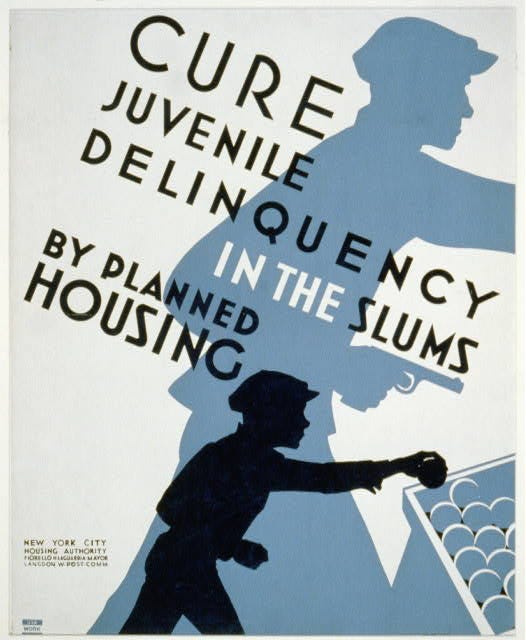Reply to Philippe Lemoine
Are we condemned to believe in the magic of "culture" and "assimilation"?
Cure juvenile delinquency in the slums. Federal Art Project, New York, 1936.
We may adopt a line of reasoning because it fits the current consensus, and not because it makes sense.
By framing the immigration issue in terms of "culture," Philippe Lemoine leads us to conclude that non-European immigrants are no real problem as long as they "assimilate" (Lemoine, 2025).
Is this really true? I understand why people fall for this line of reasoning — we all believe in the existence of culture and cultural differences. But there is much less consensus on genetics and, uh.... Look! A squirrel!
In reality, crime rates are higher among the more assimilated, non-practicing Muslims than among the less assimilated, practicing ones. This is the case in France (Yildiz, 2017). The two groups also show similar differences in non-criminal, but still undesirable aspects of behavior. This should be no surprise. Religion, like culture in general, serves the purpose of controlling innate desires and channeling them in the right direction.
So when non-European immigrants "assimilate" they abandon their cultural restraints and adopt those of Europe. Unfortunately, the latter are much weaker than the former. This isn't the Europe of the 1950s (let alone the one that existed before the Enlightenment). This is a Europe where cultural restraints have largely ceased to exist.
Non-European immigrants are thus leaving an environment where they are closely controlled by family, community, and religion and entering one where they have much more freedom to express their inner drives, desires, and impulses. This is the modern cultural environment — in France and throughout the West. Because the constraining influence of culture is relatively weak, differences in behavior, be they among individuals or between groups, are influenced much more by genetics.
I understand the reluctance to discuss genetics in this context. No need to sit me down and patiently explain to me the 20th century. I know all that. But I also know that the 21st century will not be a walk in the park if we ignore genetic factors and their role in human differences.
It is not simply because of "culture" that some people are far more willing to resolve personal differences through violence. It is not simply because of "culture" that some people are more focused on the present and seem unconcerned about the future. It is not simply because of "culture" that some people are better at thinking through a problem and solving it.
Well, let me restate the last paragraph. These things are wholly due to culture, but not as you might think. Humans adapt to their way of life, just as they adapt to their natural environment — more so, in fact. Culture creates a "template" for natural selection. It favors the survival and reproduction of those who can best fit into their culture and exploit its possibilities.
So, over time, a behavior that starts off being 100% cultural will become more and more genetic. This is the kind of evolutionary trajectory that humans have followed, and it has differed from one population to another.
If none of the above makes sense, well, I gave it my best try. Perhaps we are condemned to believe in the magic of "culture" and "assimilation." Perhaps we'll have to learn some things the hard way.
Note
La pratique de l’islam est perçue de manière quasi unanime comme un canalisateur de la délinquance. Nous avons pu observer une corrélation entre pratique religieuse et abandon de la délinquance sans, bien évidemment, établir de lien de causalité entre non-pratique religieuse et délinquance. Ce constat tend à confirmer l’hypothèse selon laquelle la religion permet une forme de réhabilitation pour certains jeunes délinquants.
À la lumière de notre recherche, nous pouvons souligner qu’il s’agit avant tout d’une canalisation de la petite délinquance. Même si elle n’est pas démontrée, cette vision de l’influence de la religion est partagée par la grande majorité des interviewés.
Nos travaux vont ainsi dans le sens des études démontrant un impact positif de la religiosité sur la délinquance (par exemple celles de Stark, 1997 ; Jensen et Erickson, 1979 ou Higgins et Albretch, 1977) : l’islam est perçu comme permettant d’inhiber les conduites déviantes. Dans nos entretiens, nous constatons que les musulmans délinquants sont les plus superficiellement religieux. (Yildiz, 2017)
References
Lemoine, P. (2025). Immigration and French Politics. Aporia Magazine, April 13.
Yildiz, T. (2017). Islam et lien social dans les quartiers défavorisés d’Île-de-France. Sociétés, 138(4), 73-84. https://doi.org/10.3917/soc.138.0073



"the 21st century will not be a walk in the park if we ignore genetic factors and their role in human differences."
So true. Thanks for putting it that way.
I agree 100%. Take the leash off the dog and you will allow the broader, natural repertoire of instinctive behaviors to be expressed.
Thank you for your work!